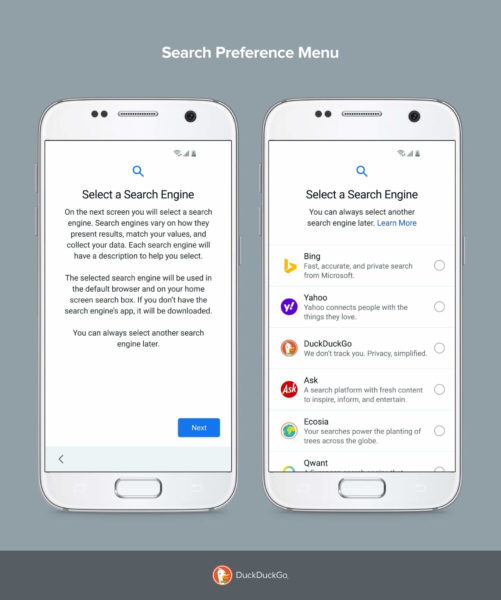Responding to a European antitrust decision against app bundling and pre-installation, Google announced a system last year to present search alternatives to Android users upon device set-up. The resulting “Android choice screen” presents three alternatives (and Google), using an auction to determine the specific competitors.
DuckDuckGo and Info.com bid successfully and are available on the choice screen in all European markets; otherwise there is some variation by country. Google critics decried the auction mechanism as “pay to play” and some Google rivals declined to participate in the auction accordingly.
New choice screen would boost competition. DuckDuckGo has now produced user research that argues Google would see its mobile market share, which is now roughly 95%, decline by roughly 20 points with a different search choice screen design. Specifically, DuckDuckGo says that “Google’s mobile market share is likely to immediately drop by 20%, 22%, and 16% in the U.S., U.K., and Australia, respectively” if its recommended design were adopted.
During the research, the company presented an alternative choice screen with many more search engines to a total of 9,000 users in three countries. It performed an eye tracking analysis and also tested different placements for Google in the list.
DuckDuckGo designed search preference screen

Google loyalists sought Google. The study found that users were willing to scroll to look at the entire list, often to locate Google. DuckDuckGo explains the choice of Google didn’t depend on placement, whether on the first mobile screen or the last.
Interestingly, the company uses the finding of Google loyalty to argue that the remainder of the audience is evidence of “pent-up demand” for alternatives. Loyalists scrolled and found Google; others chose Google rivals. In other words, 20% of the audience isn’t loyal to Google and merely passively using it by default.
DuckDuckGo further claims that adopting a version of its recommended choice screen, presumably without the auction, would dramatically improve the market share of Google’s competitors. It points to Russia, where Yandex was reportedly able to make mobile gains against Google, after antitrust regulators intervened, as provisional evidence for this predicted outcome.
DuckDuckGo has been actively engaged in discussions with U.S. antitrust regulators and has pitched its choice screen design to them. Regardless, it wouldn’t be a surprise to see a similar unbundling of pre-installed Android apps and search choice come to the U.S. in the not-too-distant future.
Why we care. If DuckDuckGo’s findings are accurate, and if its choice screen were adopted, search marketers might need to think about diversifying their SEO Company and paid-search strategies beyond Google and Bing. As a practical matter, however, it would be very challenging for any individual engine to rise above a point or two — DuckDuckGo has less than 2% share — and they might simply be ignored.
Website Design & SEO Delray Beach by DBL07.co
source http://www.scpie.org/duckduckgo-googles-mobile-share-would-drop-20-with-new-search-choice-screen/

No comments:
Post a Comment